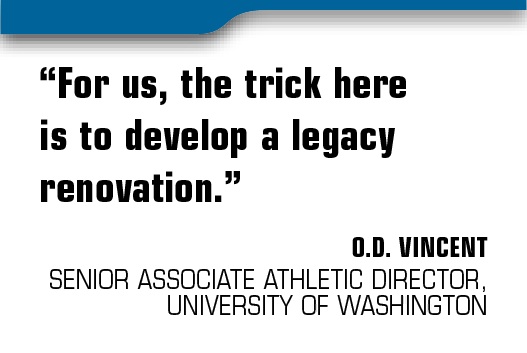The University of Washington has signed landmark deals with Daktronics and Harris Corp. to develop a digital communications network covering about 10 sports facilities at the Pac-12 Conference school.
The deals are 10-year agreements with a combined value of $17 million, tied to technology upgrades at Husky Stadium and Alaska Airlines Arena, said O.D. Vincent, Washington’s senior associate athletic director. The cost includes $11 million for new Daktronics scoreboards and LED screens at the stadium and arena. In addition, Harris Sports developed a $6 million Internet protocol television network, the tech engine driving exclusive video content to a combined 800 television monitors at both facilities.
 |
The IPTV system will debut at refurbished Husky Stadium when it reopens for the 2013 season.
Rendering: COURTESY OF UNIVERSITY OF WASHINGTON
|
Together, Daktronics and Harris Sports have the potential to expand their systems to all buildings on campus, although connecting school facilities outside of sports is not yet under consideration, Vincent said.
The depth of the technology as it relates to the university’s sports venues is thought to be the first of its kind in the college space, said Bob Jordan, the school’s consultant and former vice president of design and construction at MetLife Stadium. Jordan played a principal role for the IPTV installation at the NFL home of the Jets and Giants.
IPTV systems are common in the major leagues but not so much at colleges. A few college venues such as KFC Yum! Center in Louisville and Florida Atlantic University’s year-old football stadium have IPTV, but none are operating to the extent of what is taking place at Washington.
“I don’t know of anybody that has done this … to coordinate, integrate, transmit and brand content across an athletic campus from a centralized location,” Jordan said. “It’s on par with any pro facility.”
The athletic department, with Jordan’s expertise, made a strategic decision to pursue new technology linking the arena and the stadium, which is closed for the 2012 season during a $250 million renovation. The stadium reopens next fall after two years of construction.
The IPTV system, run by a central control room in the arena, helps power all screens at both the stadium and arena. The arena, with 120 monitors, plus the new center-hung and LED boards, is up and running after officials flipped the switch Aug. 24 for a women’s volleyball match.
When Husky Stadium’s retrofit is completed, 680 monitors will function as digital menu boards and advertising displays. Similar to big league venues with IPTV, those screens can change concession prices and segment sponsors’ messages, all with the push of a button.
Over the next several years, the school intends to connect its baseball, softball, soccer, track, tennis, crew and other venues to the network.
“We wanted to make sure that there was a path for the future set in place to have all the venues at a comparable level,” Jordan said. “Daktronics came up with the idea, and it quickly became part of the package.”
For tech upgrades at the smaller venues, Daktronics established a reserve fund at Washington where the company will contribute $1.2 million over the next six years to cover the costs for new digital monitors at those facilities, Vincent said.
The Daktronics/Harris deals should ultimately generate significantly more revenue for the school’s athletic programs as the new technology is pitched to existing and potential sponsors, officials said. Those deals extend to the 12 founding partnerships the school is selling to help finance Husky’s renovation. For the stadium, it is difficult to project the increase in revenue “since it is such a large overhaul from our old building,” Vincent said.
Washington’s total tech package “puts the university in a different league” compared with other schools, Jordan said. “The paradigm changes for selling and branding different events,” he said. “It changes the way they sell with more precise distribution of their product.”
For the rest of the Pac-12, the millions every school receives as its cut from the league’s new television networks could be used for similar tech upgrades at their facilities, said Mike Arthur, general manager of Harris Sports & Live Events, the Harris Corp. division that works with teams and venues. In turn, schools can leverage those IPTV installations to develop “compelling” inventory tied to video content at their arenas and stadiums, Arthur said.
In Seattle, the tech deals also go a long way toward extending the life of Washington’s 92-year-old stadium and 85-year-old arena.
“We developed a solution to stand the test of time,” Vincent said. “For us, the trick here is to develop a legacy renovation.”
The cost to install the arena’s new center-hung board and LED screens comes out of the stadium renovation budget. Vincent estimated the school saved about $3 million by consolidating the process and bringing the arena piece of the business into the overall deal.
“The thought was if we could bundle these systems, it would be more affordable and much more integrated,” Vincent said.
Washington’s deals show “great creativity and vision,” said consultant Russ Simons, managing partner of Venue Solutions Group in Nashville, a firm that advises sports facilities on renovations.
“In many cases, just the creation and repair and replacement plan [for scoreboards] is a monumental task,” Simons said. “Recognizing when capital dollars are likely to be spent, a school can look for economies of scale as a variety of projects are being conducted on campus.”





